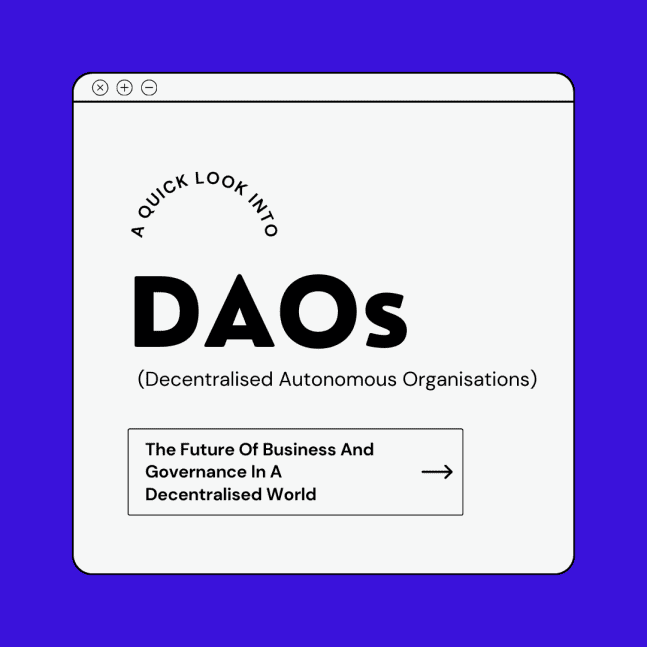In recent years, the concept of Decentralised Autonomous Organisations (DAOs) has gained significant attention and traction. In Australia, there is growing interest in the potential of DAOs to revolutionise the way businesses operate, by fostering a more transparent, efficient and decentralised approach to governance and decision-making. This new decentralised model holds significant potential for Australian businesses across various industries and is poised to disrupt traditional corporate structures. Despite its potential, let’s explore the general concept of DAOs, where we’re at in terms of regulation and the potential implications for Australian businesses and our wider economy.
What is a DAO?
A DAO is a digital organisation that operates on blockchain technology, allowing it to function independently of any central authority or leadership. It is effectively community organised and is run by its members, who can together make decisions through a decentralised governance process that is transparent and verifiable. In a DAO, you generally need to own that DAOs governance token to then participate in the decision-making process or to receive rewards. An individual’s voting power is directly proportional to the number of tokens they hold (1 token = 1 governance vote). All transactions are also recorded on the blockchain, which in turn provides an immutable record of the organisation’s activities to date.
DAOs can be created to manage a wide range of activities, from traditional business operations like product development and marketing, to more experimental use cases like decentralised finance or community building. The underlying technology in which a DAO is based on allows them to run autonomously, and able to be designed to operate 24/7, without the need for human intervention. DAOs operate by using smart contracts, which essentially is code that has been developed to automatically execute whenever an agreed criteria has been fulfilled.
Regulation
In Australia, the Corporations Act 2001 (Cth) is the main piece of legislation that underpins the regulation of corporations, financial markets and products and services. DAOs are not currently expressly legislated for and with the rising level of interest in this new and innovative business structure, legislative intervention is needed.
There are only a few international jurisdictions that have taken the leap to address the concerns regarding DAO regulation. The state of Wyoming in the United States was the first to legally recognise DAOs and grant them the same legal rights as limited liability companies, with the states of Vermont and Tennessee following suit. The Marshall Islands has also since done the same, however, many other jurisdictions are still undecided on how to tackle the issue of DAO regulation and recognition.
It has been recommended by the Senate Select Committee’s Technology and Financial Centre that DAOs be legally recognised as a company structure. This would grant a separate legal identity and provide limited liability to the DAO token holders as well.
Implications of DAOs
The rise of DAOs in their current form may lead to a plethora of hurdles and implications to those on the short end of the stick. Primary concerns are around liability – who would be held liable for shortcomings, especially where crime is involved?
There are also great risks when it comes to the core governance of a DAO. As a DAO is governed by the code (rules) of a smart contract, there is potential for these rules to be hacked or manipulated, which in effect may lead to serious consequences.
Nevertheless, one of the biggest advantages of DAOs is that it allows for decentralised decision making, where every member of a DAO has an equal say in the decision making process, and thereby creates a more democratic and transparent system. DAOs could potentially prove to be more efficient, more effective, and more resilient than traditional organisations as well. As such, they are attracting attention from a diverse range of industries, from finance and supply chain management to the arts and community-building.
All in all, DAOs represent a revolutionary new way to run businesses and organisations, and this new decentralised model of operations holds significant potential for Australian businesses. While the concept is still in its early stages, especially here Down Under, the transparency, efficiency and decentralised nature of the model makes it worth the attention (and the wait!).






